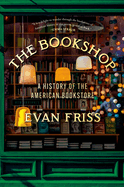
"Bookstores, even the little ones, can shape the world around them. They already have," writes Evan Friss in The Bookshop: A History of the American Bookstore, a fantastic journey that delves into the impact of independent bookshops on the social and cultural fabric of the United States. And they are bookshops, as Friss points out, not bookstores--venues that navigate a careful balance between community and commercial spaces. The Bookshop traces these places, from Benjamin Franklin's existence as a "shopkeeper who sold books," whose efforts "can be viewed as attempts to unite the colonies through knowledge," through Boston's Old Corner in the 1800s and its introduction of browsing into bookshop culture, and all the way up to the modern day and the people who fight to keep these places open.
Bookshops have always been under threats, but they have also adapted to times and political climates, uniting communities across geographies, and shaping societies around them, through revolution, abolition, Pride, and the Black Lives Matter movement. Friss (On Bicycles: A 200-Year History of Cycling in New York City) reminds readers that above everything, people go to bookshops because they "often just want company," and that these hybrid "literary playgrounds and capitalist enterprises" are also "critical sites for intellectual, social, political, and cultural exchange" that "nurture existing communities and foster new ones." The Bookshop argues persuasively that not only are these institutions a crucial part of U.S. social and political history, but that they are also worth fighting for in the face of a new generation of technological and financial threats. Be sure to find a copy through your local independent bookshop. --Michelle Anya Anjirbag, freelance reviewer

